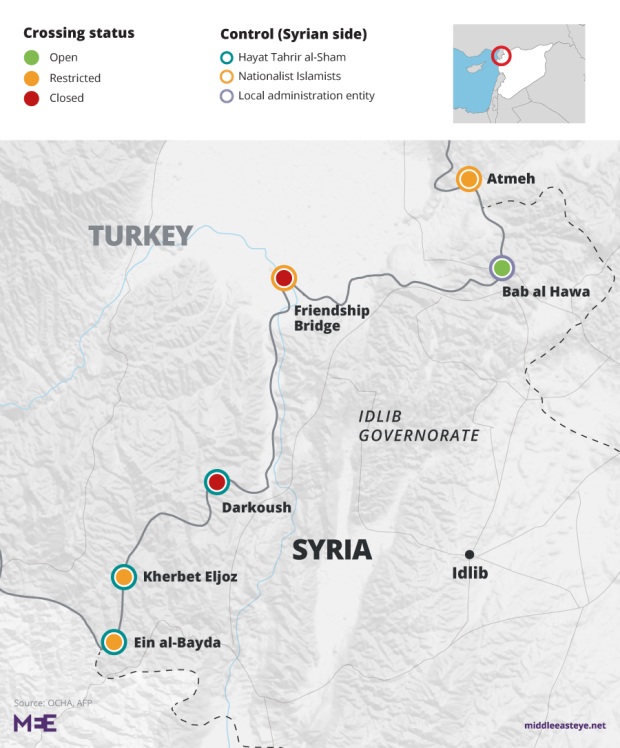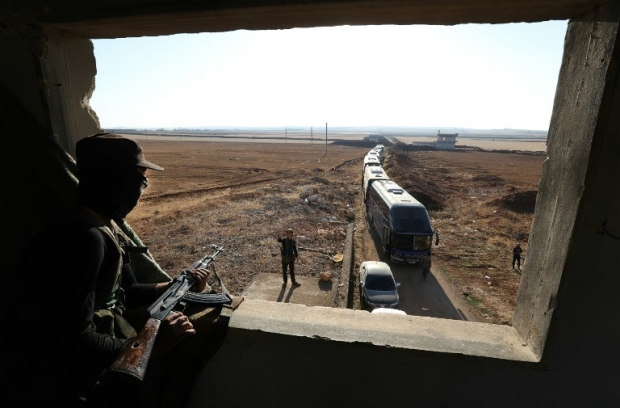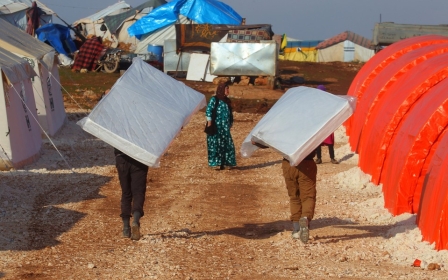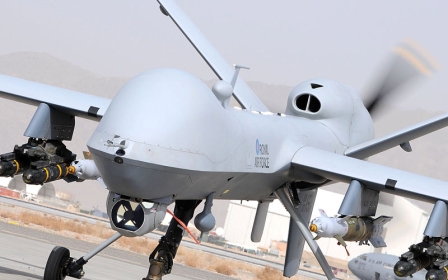Charities warned that sending aid to Syria's Idlib could be a 'terror offence'
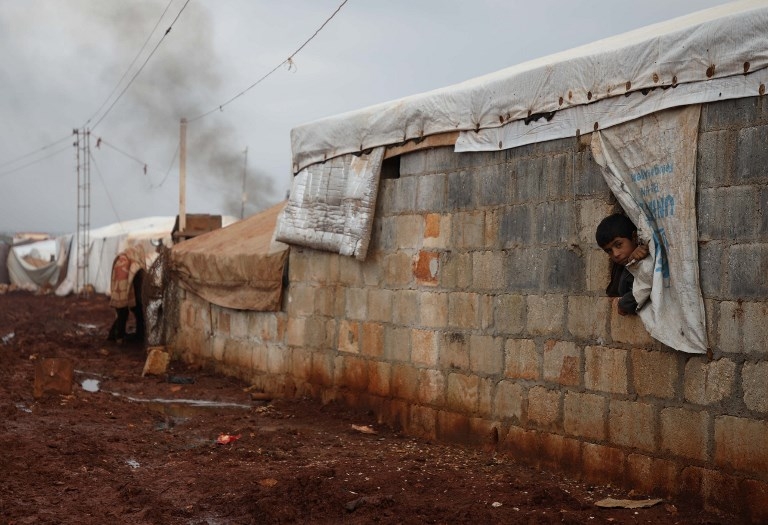
British charities sending aid into Idlib could be at risk of committing terrorism offences if they use the Bab al-Hawa border crossing from Turkey into the Syrian opposition-held enclave, the UK's charity regulator has warned.
In an alert to charities, the Charity Commission said that Bab al-Hawa, the main supply route into Idlib, was reportedly under the control of Hayat Tahrir al-Sham (HTS), a proscribed terrorist organisation in the UK, which "could incur financial benefit" from any deliveries of aid through the crossing.
Middle East Eye understands that, prior to issuing the alert, the commission wrote to a number of charities to raise concerns that they were using Bab al-Hawa.
"Trustees of charities which are currently using the Bab al-Hawa crossing either directly or through partner organisations must consider the risks of committing an offence under UK Counter Terrorism Legislation ... and take appropriate action in the best interests of their charity," said the alert, which was published on Monday.
"This may include suspending or stopping the movement of aid via the Bab Al-Hawa crossing at this time or exploring alternative routes."
The alert also said that charities that had used the crossing since September should consider reporting themselves to both counter-terrorism police and to the commission if they believed or suspected that a terrorist financing offence had been committed.
'Designated areas' ban
But some charity officials told Middle East Eye they were concerned that the alert was part of an effort to discourage charities from continuing to operate in areas like Idlib ahead of the passing of a proposed new law that would allow the government to ban British citizens from travelling to "designated areas" for the purpose of "protecting members of the public from a risk of terrorism".
"The commission are trying their best to stop the charities from working in areas like Syria altogether," said a former trustee of one British charity sending aid to Idlib, who did not want to be identified because of the sensitivity of the subject.
"They use indirect tactics to discourage, to try and close charities down and put people off getting involved.
"It's supposed to be a body that protects charities from being misused. But if somebody is working in a high-risk area you should be supporting them and not threatening them."
HTS, one of the main fighting groups in Idlib, is an alliance of Islamist militants that includes fighters who formerly belonged to the Nusra Front, al-Qaeda's affiliate in Syria, though Nusra publicly broke away from al-Qaeda in 2016 and changed its name to Jabhat Fatah al-Sham.
Since 2014, Bab al-Hawa, which is on the main cross-border road running into Idlib from the Turkish city of Reyhanli, has been the primary delivery route for a United Nations-backed humanitarian effort in Idlib, with an average of more than 200 aid trucks crossing the border each month.
According to a United Nations border crossing status update published last month, Bab al-Hawa is the only open crossing into Idlib and is listed by the UN as being under the control of a "local administration entity".
Three other crossings into Idlib, two marked as restricted and one as closed, are listed by the UN as under HTS control. Two other crossings, one closed and one restricted, are listed as being under the control of "nationalist Islamists".
More than two million people in Idlib, many of them displaced from other areas of Syria during the country's seven-year civil war, are estimated to rely on humanitarian aid.
Jan Egeland, head of the UN's humanitarian task force for Syria, has described the province as "the largest cluster of refugee camps and displaced people in the world".
USAID food kits went to HTS fighters
Government aid agencies, including the UK's Department for International Development (DFID) and the US equivalent, the United States Agency for International Development (USAID), also use the crossing regularly. They have investigated reports of aid passing through Bab al-Hawa benefiting HTS.
In September, both USAID and DFID told their local partners to stop using Bab al-Hawa because of concerns that HTS was collecting taxes from aid trucks crossing the border.
But both organisations resumed deliveries after the Salvation Government, the HTS-backed civilian administation responsible for running the crossing, said in a statement that it would stop levying fees on aid trucks from 1 October.
It said the fees previously charged had been used to maintain and repair the road used by the trucks.
In a report filed to Congress in November, the Office of Inspector General, which audits USAID's work, said it had uncovered "multiple schemes to divert USAID funds and goods to armed groups in northwest Syria," including HTS.
"In one case, an implementer’s employees submitted falsified beneficiary lists to divert thousands of food kits worth millions of dollars to ineligible beneficiaries (including HTS fighters)," the report said.
In the UK, the opposition Labour party last month urged the government to ask the National Audit Office to investigate whether any DFID aid has been diverted to HTS.
Foreign office minister Alistair Burt told parliament that DFID had halted aid through Bab al-Hawa in September as a precautionary measure while it investigated reports of HTS collecting fees from aid trucks, but said the situation had been "swiftly resolved".
"Our programmes are delivered by trusted NGO and UN partners with proven expertise and track records. We do not provide funding unless these organisations can assure DFID that it will not benefit extremists," Birt said.
Aid convoys disrupted
Many large British charities, including Islamic Relief, Muslim Aid and Save the Children continue to operate in Idlib with local partners.
Several smaller British charities, many of them rooted in Muslim communities in the UK, have also continued to send deliveries of aid supplies to Idlib, despite scrutiny of their work by the Charity Commission and counter-terrorism police.
In the early years of the Syrian war, hundreds of volunteers from the UK travelled to refugee camps in southern Turkey and northern Syria, often driving in convoys of ambulances and other vehicles across Europe.
But the convoys mostly stopped in 2014 after the Charity Commission issued an alert warning that they could facilitate the travel of people going to Syria to join militant groups. Several charities were placed under investigation by the commission, and border police also used cash seizures and Schedule 7 stops to disrupt the convoys.
Since then, most smaller charities in the UK have sent aid in shipping containers to the port of Mersin in Turkey, from where it is driven to Syria in trucks and distributed by local partners.
Jahangir Mohammed, a consultant advising several charities working in Syria, said that he had told his clients that they needed to "manage the risks" in light of the alert if they intended to keep working in Idlib.
"What I've told them is: 'You've got partners on the ground who know the situation well. If you want to continue working and take the risks, you need to manage those risks by demonstrating you have satisfactory information from your partners on the ground that aid is being securely delivered, and not going to HTS and other fighting groups,'" Mohammed told MEE.
Jilu Miah, the director of operations at Human Aid, a London-based charity which earlier this year launched an "Idlib Besieged" appeal, said the charity was in discussion with lawyers and its local partners on the ground in Syria about the implications of the alert for the charity's work.
If there was a tax on us then we would have to avoid it and look at alternative routes but we have never been taxed
- Jilu Miah, Director of Operations, Human Aid
He said the charity's operations were coordinated by local "cluster teams" that liaised with multiple aid organisations and local authorities to ensure that aid was directed where it was needed.
Miah said Human Aid had never encountered any problems with armed groups in delivering aid through Bab al-Hawa, and that any effort by fighters to extract a levy would not be tolerated.
"There is no levy on passing through the border as an aid agency. We have never been charged. The only charges we have are the truck driver and warehouse costs," Miah told MEE.
"If there was a tax on us then we would have to avoid it and look at alternative routes but we have never been taxed."
The former charity trustee also told MEE that aid deliveries into Idlib were generally left alone by armed groups. But he said that aid organisations inevitably had to have some contact with those in control on the ground, including HTS.
"Nobody is hiding the fact that HTS is in control. How is it possible not to talk to them if you want to get aid delivered? You have to talk to them. Does that mean you are supporting HTS as a terrorist organisation? That is a joke."
10-year prison sentence
Charity sector sources spoken to by MEE said the alert raised further concerns about restrictions on their work following discussion in parliament this week of the proposed "designated areas" law, which leading aid organisations say would severely restrict their ability to respond to humanitarian crises in war zones.
The proposed offence is part of the Counter-Terrorism and Security Bill, which is in the final stages of parliamentary scrutiny, and would carry a maximum 10-year prison sentence.
Neil Basu, the head of counter-policing in the UK, says that a designated areas law would help to tackle the threat posed by returning foreign fighters in the event of a future conflict like the one in Syria, in which hundreds of British nationals are estimated to have travelled to join militant groups.
But in a joint statement last week, the chief executives of charities including Oxfam, Action Aid UK and Islamic Relief, said the bill "would in effect make it a criminal offence for British aid workers to provide support to vulnerable people in war-torn countries".
The House of Lords this week passed an amendment that would exempt aid workers from the law, but the final draft of the bill has still to be approved by the House of Commons.
Middle East Eye propose une couverture et une analyse indépendantes et incomparables du Moyen-Orient, de l’Afrique du Nord et d’autres régions du monde. Pour en savoir plus sur la reprise de ce contenu et les frais qui s’appliquent, veuillez remplir ce formulaire [en anglais]. Pour en savoir plus sur MEE, cliquez ici [en anglais].



